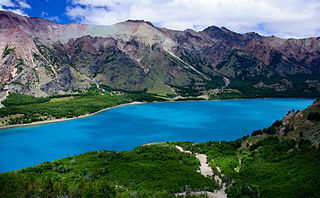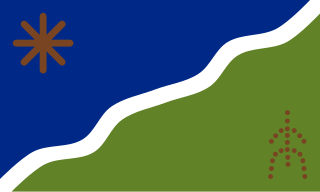
Mapuche is an Araucanian language related to Huilliche spoken in south-central Chile and west-central Argentina by the Mapuche people. It is also spelled Mapuzugun and Mapudungu. It was formerly known as Araucanian, the name given to the Mapuche by the Spaniards; the Mapuche avoid it as a remnant of Spanish colonialism.
Pablo is a Spanish form of the name Paul.

The Aysén del General Carlos Ibáñez del Campo Region, often shortened to Aysén Region or Aisén, is one of Chile's 16 first order administrative divisions. Although the third largest in area, the region is Chile's most sparsely populated region with a population of 102,317 as of 2017. The capital of the region is Coihaique, the region's former namesake.
Koko or KOKO may refer to:

Masahiro Chono is an American-born Japanese-American retired professional wrestler and actor best known for his 26 year stint with New Japan Pro-Wrestling (NJPW). As the leader of nWo Japan, Team 2000 and Black New Japan, he was the promotion's top heel for much of his career, beginning in 1994 when he adopted his Yakuza inspired gimmick.

The Kawésqar, also known as the Alacalufe, Kaweskar, Alacaluf or Halakwulup, are an indigenous people who live in Chilean Patagonia, specifically in the Brunswick Peninsula, and Wellington, Santa Inés, and Desolación islands northwest of the Strait of Magellan and south of the Gulf of Penas. Their traditional language is known as Kawésqar; it is endangered as few native speakers survive.
Ani is a ruined Armenian medieval city in Turkey.

The Chiloé Archipelago is a group of islands lying off the coast of Chile, in the Los Lagos Region. It is separated from mainland Chile by the Chacao Channel in the north, the Sea of Chiloé in the east and the Gulf of Corcovado in the southeast. All islands except the Desertores Islands form Chiloé Province. The main island is Chiloé Island. Of roughly rectangular shape, the southwestern half of this island is a wilderness of contiguous forests, wetlands and, in some places, mountains. The landscape of the northeastern sectors of Chiloé Island and the islands to the east is dominated by rolling hills, with a mosaic of pastures, forests and cultivated fields.

The Chono, or Guaiteco were a nomadic indigenous people or group of peoples of the archipelagos of Chiloé, Guaitecas and Chonos.
Seba or SEBA may refer to:
Chono is a poorly attested extinct language of confusing classification. It is attested primarily from an 18th-century catechism, which is not translated into Spanish.
The origin of the Mapuche has been a matter of research for over a century. The genetics of the Mapuche do not show overly clear affinities with any other known indigenous group in the Americas, and the same goes for linguistics, where the Mapuche language is considered a language isolate. Archaeological evidence shows Mapuche culture has existed in Chile at least since 600 to 500 BC. Mapuches are late arrivals in their southernmost and easternmost (Pampas) areas of settlement, yet Mapuche history in the north towards Atacama Desert may be older than historic settlement suggest. The Mapuche has received significant influence from Pre-Incan (Tiwanaku?), Incan and Spanish peoples, but deep origins of the Mapuche predates these contacts. Contact and conflict with the Spanish Empire are thought by scholars such as Tom Dillehay and José Bengoa to have had a profound impact on the shaping of the Mapuche ethnicity.
Yagan (1795–1833), was an Indigenous Australian warrior.
This page is based on this
Wikipedia article Text is available under the
CC BY-SA 4.0 license; additional terms may apply.
Images, videos and audio are available under their respective licenses.





